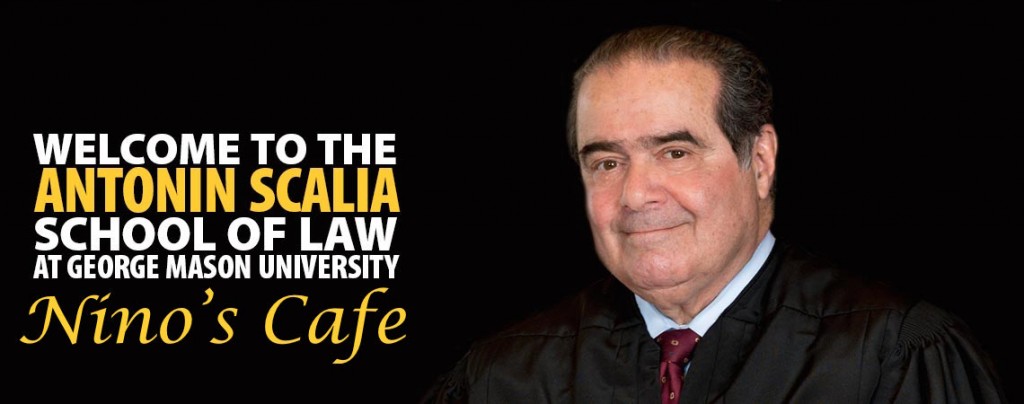Nina Totenberg tweets the breaking news about my alma matter:
Also, I think this tweet by Eric Segall in response to Ian Millhiser is exactly right:
Update: WSJ has this report:
George Mason University School of Law, named after a founding father known for his refusal to sign the Constitution, now plans to rename itself after a man famed for a strict adherence to its words: Justice Antonin Scalia.
George Mason University’s Board of Visitors is expected to vote on the renaming Thursday afternoon. The new full name of the Fairfax, Va., school will be the Antonin Scalia School of Law at George Mason University, school officials said. The school expected to unveil the name change Thursday afternoon, along with an announcement that it has received two donations totaling $30 million, including a $10 million grant from the Charles Koch Foundation.
The change will still then need a final go-ahead from Virginia’s higher education oversight agency, which is expected to give its blessing.
The school’s dean expects that people will call it Scalia Law School for short. By July, all the school’s signage and marketing materials will bear the late justice’s name, school officials said.
Update 2: The President of GMU sent out this news release:
Dear Patriot,
Today, I am pleased to announce one major gift and several naming decisions, just approved by the Board of Visitors.
First, we have received pledges totaling $30 million to support the School of Law. These gifts, which combined are the largest in university history, will help establish three new scholarship programs, enabling us to attract more of the most talented law student candidates in the country.
The gift will create the Antonin Scalia Scholarship, named after the late Supreme Court Justice; the A. Linwood Holton, Jr. Leadership Scholarship, named after the former governor of Virginia; and the F.A. Hayek Law, Legislation and Liberty Scholarship, named after the late 1974 Nobel Prize winner in economics. The Scalia scholarships will be awarded to students with excellent credentials, the Holton scholarships to students who have overcome barriers to academic achievement, and the Hayek scholarships to students with great potential in the field of law and economics. All scholarships will be awarded exclusively and independently by the university.
As part of the gift agreement, our law school will be named the Antonin Scalia School of Law at George Mason University in honor of the long-term Supreme Court Justice.
Justice Scalia was an advocate of vigorous debate and enjoyed thoughtful conversations with those he disagreed with, as shown by his longtime friendship with Justice Ruth Bader Ginsburg, who said, “Justice Scalia was a law teacher, public servant, legal commentator, and jurist nonpareil. As a colleague who held him in highest esteem and great affection, I miss his bright company and the stimulus he provided, his opinions ever challenging me to meet his best efforts with my own. It is a tribute altogether fitting that George Mason University’s law school will bear his name. May the funds for scholarships, faculty growth, and curricular development aid the Antonin Scalia School of Law to achieve the excellence characteristic of Justice Scalia, grand master in life and law.”
That ability to listen and engage with others, despite having contrasting opinions or perspectives, is indeed at the heart of what higher education is all about.
This generous gift includes $20 million from a donor who wishes to remain anonymous, and a $10 million matching gift from the Charles Koch Foundation. We are deeply grateful to both parties for their support of George Mason University students.
This gift pushes the university’s comprehensive Faster Farther campaign past the $400 million mark on its way toward meeting our overall $500 million goal. I am particularly pleased that this gift will directly support students, the most important priority in our campaign.
The gift also provides a tremendous boost for the law school to firmly retain its position among the nation’s finest. The gift is intended to further the School’s new strategic plan, recently developed under the leadership of Dean Henry N. Butler.
The Board of Visitors today also approved the naming of a prominent public space on our Fairfax Campus after Governor Holton, who in 1972 signed into law the establishment of George Mason as an independent university. During his term as governor, he fought for school desegregation and equal opportunity, values of accessibility and inclusion that we hold so dear at Mason. Holton Plaza will be immediately adjacent to the Center for the Arts.
Finally, the Board of Visitors today approved the naming of the Occoquan Building on the Science and Technology Campus as “Senator Charles J. Colgan Hall” in honor of the longest-serving state senator in the history of Virginia. The recently retired Democratic senator from Prince William County was known and respected for reaching across the aisle to achieve state objectives, inspiring his colleagues and future public servants to work together for the common good. He was an ardent supporter of higher education, and the architect behind hundreds of millions of dollars invested in our university, Northern Virginia Community College, and universities across the Commonwealth.
Today’s board actions highlight the outstanding contributions of so many individuals, from business to government, who helped us build this university from a small branch campus of the University of Virginia to its current status as a tier-one research university with the largest enrollment of any public university in the Commonwealth. I am grateful to each one of them.
Thank you for all you do for George Mason University.
Sincerely,
Ángel Cabrera


